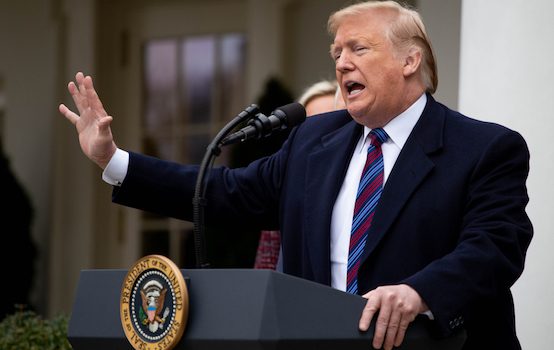Misled on the Wall, Trump Must Hold Firm Against the Wars

President Donald Trump’s first veto will now likely be of the resolution seeking to block his use of emergency powers to build a border wall. Whatever the merits, that’s better politics—and more “America First”—than vetoing Congress’s attempt to stop U.S. support for the Yemen war.
Trump promised during the 2016 campaign to guard America’s borders rather than police the world. The reason he finds himself in the position of fighting for a national emergency declaration is that he listened to lawmakers, including some influential members of his own party, whose priorities ran in the opposite direction.
Late last year when Trump began his ill-fated wall showdown and called for winding down two wars—one that had gone on too long, the other that was never authorized by Congress or our business to fight in the first place—it appeared he had belatedly learned this lesson.
Hope springs eternal, but contrary evidence keeps emerging. The latest is an NBC News report on a letter in which Trump appears to concur with members of Congress who want to keep a residual American force in Syria as part of a military intervention they never authorized.
“I agree 100%,” Trump wrote above a paragraph in the letter he highlighted. “ALL is being done.” Perhaps the mercurial president wasn’t changing his mind from when he called for stopping “endless wars” during the State of the Union address but rather offering lawmakers some “mission accomplished” reassurance. I sat next to former Trump advisor Sebastian Gorka as he told an interviewer at CPAC that unlike the neoconservatives, the president’s first instinct is always to bring the troops home.
But taken together with the administration’s hawkish stances on Venezuela, Iran, and Yemen, as well as the interventionist tilt of Trump’s foreign policy team—John Bolton, Mike Pompeo, now even Elliot Abrams—it is not encouraging. Trump has been constrained on Syria and Afghanistan before.
While the situation at the border has deteriorated in recent weeks with a surge of asylum-seeking migrants, Trump should have fought for his preferred immigration policies when Republicans controlled Congress and red-state Senate Democrats were at risk of losing their seats in the midterm elections. He didn’t.
Democrats, as the majority party in the House, now control the power of the purse. Nancy Pelosi’s chamber is where the appropriations process begins and no declaration of emergency will change that.
The president still wields considerable power over foreign policy, however. He should use it, remembering that the people telling him to wait to end the wars are largely the same crowd who wanted him to wait on the wall funding that never came.
For example, instead of fighting with Rand Paul over emergency powers, Trump should join forces with him on Afghanistan. Paul, a Republican senator from Kentucky, and New Mexico Democratic Senator Tom Udall have a new bill requiring the Pentagon to plan for pulling most U.S. troops out of America’s longest war.
“We’ve accomplished our mission in Afghanistan and it’s time to bring our troops home,” Paul told reporters. “This has been a long war. We’ve spent over $2 trillion total. Twenty-three hundred have lost their lives in Afghanistan, and 20,000 wounded.” Udall added: “It is Congress that has failed to conduct its oversight duty of this war.”
One need not retroactively condemn the war, as socialist sensation Alexandria Ocasio-Cortez appeared to do on Twitter, in order to recognize that we have done all we can in Afghanistan. Punishing those who sheltered the 9/11 attackers was a militarily attainable goal. Turning Afghanistan into a functioning democracy is not.
Syria, like Iraq, is somewhere our troops never should have been, period. Congress apparently agrees, having never voted to approve our presence there—even as the Senate warns against “precipitous” withdrawal. Trump should follow his gut on this as well rather than allow conventional Republican advisors to push him off course.
Those Republicans haven’t won the White House since 2004. And many of the Democrats seeking their party’s 2020 presidential nomination don’t appear inclined to repeat Hillary Clinton’s mistakes on foreign policy—at least not during the campaign.
To shore up his base in the industrial states that delivered him the presidency, Trump needs to put some populist points on the board. The wall is now at least partially beyond his grasp. The wars are not.
W. James Antle III is editor of The American Conservative.
Comments